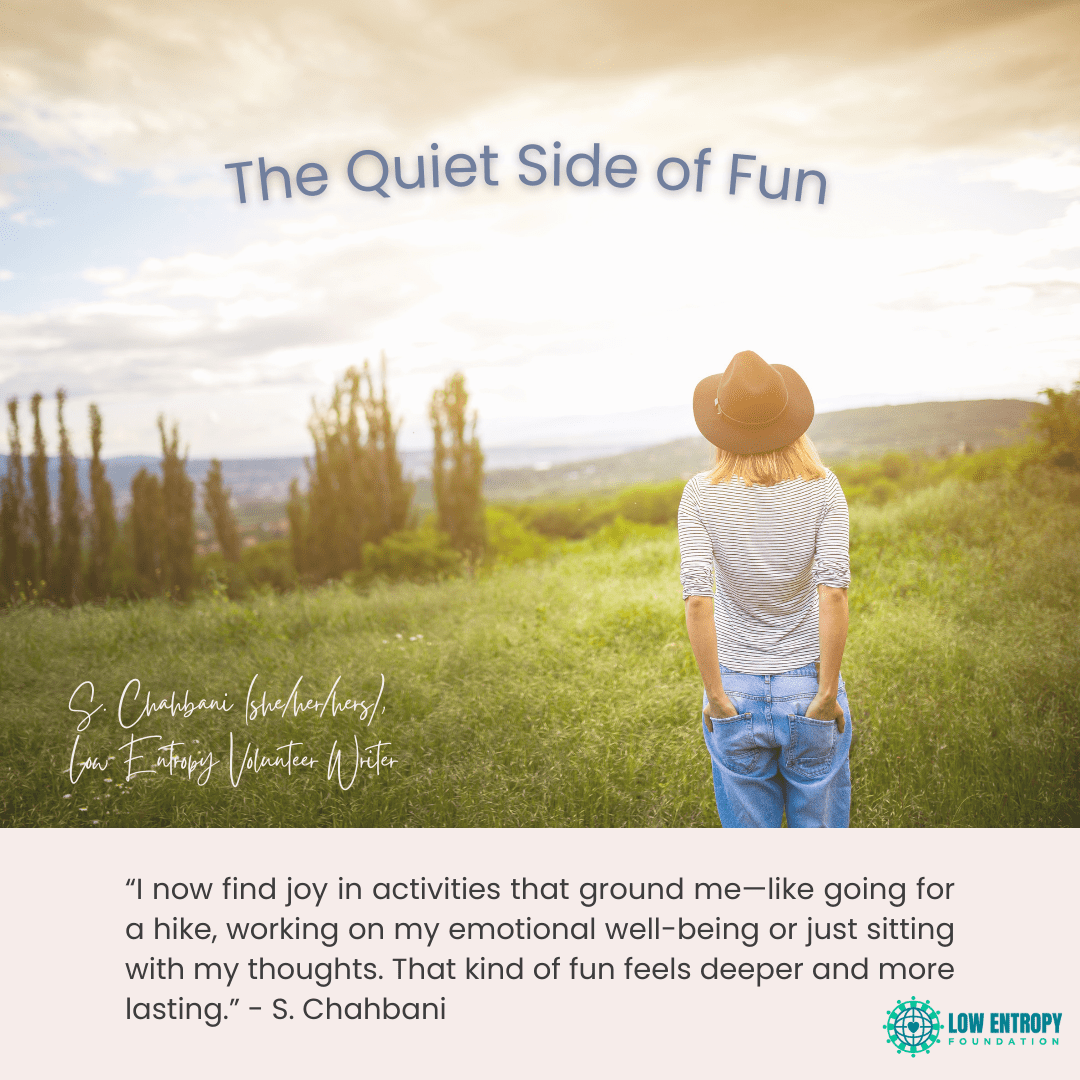- Chahbani (she/her/hers), Low Entropy Volunteer Writer
So what exactly is fun? Does having fun have a specific standard? Why are some people viewed as “meh” and others as funny-cool? I’ve been thinking about this for a while. Back then, the definition of fun was fairly simple. Given that I was born with four boys as siblings, I think games like cards, playing football as the goalie, building Legos and playing video games are enough to entertain you. Where I grew up, families would occasionally gather for summer vacations or weddings on the beaches. These were the most enjoyable days, when everyone laughed and made memories with simplicity.
What was notable was how little we were required to evidence our joy. There was no pressure to prove we were having fun. Perfectly designed experiences or social media approbation meant absolutely nothing. Bringing people together and engaging in the now was simple. Little things, such as a new deck of cards or a new game became so exciting. Fun came from a sense of connection and creativity, rather than from expectations.
As I aged, life became tough. There were the parties, outdoor activities and rule-breaking that defined teenage fun. Yet, because I was a lone girl, I was not allowed to engage in most of such activities. So, while others were sneaking out or going to events, I was still having fun doing the same things I used to do as a child. This was the first time I felt a shift—when my idea of fun no longer aligned with those around me. I guess I just became that “boring” buddy. And when people start to label you that way, it just sticks. I began to wonder: What is fun? Am I missing something?
There was a lot of pressure to fit in during my teenage years, where your leisure created who you were. There was this feeling of exclusion when you didn’t belong to the “cool” circle or you didn’t go out during the weekends. I struggled with those feelings for quite a long time. While I did want very much to belong, I didn’t want to push myself into doing things that didn’t seem right for me. No one told me at that age, however, that fun could be different for everyone, that my way of enjoying life was just as good as anyone else’s. Those questions nagged me for years. But looking back now, I realize that I wasn’t missing out. I learned that partying is just one way to have fun, and it doesn’t define you or your ability to live.
As an adult, my definition of enjoyment has, once again, changed. I no longer feel guilty about choosing quality over quantity when it comes to spending my time: endless excitement or stuffing my schedule with activities is not what counts as fun. Instead, I’ve come to appreciate a slower, more meaningful pace. I prefer meaningful moments instead. As an introvert, I found out that being with people did not exactly equate to having a good time. I thrived in smaller groups with deeper interactions. After a while, the pressure to be socially active faded. I started to embrace alone time. Reading, long walks and meditation became very fulfilling activities for me. I just did not see Fridays and Saturdays as the best nights anymore. Some of my best memories, surprisingly, now happen to fall on a Monday or a weekday.
What surprises me most is how much I value simplicity now. One doesn’t feel a need to fill the days with plans to qualify as living life to the fullest. A quiet evening with a good book or a random heart-to-heart discussion or discovering a new hobby can be better than any wild night. There seems to be a different kind of thrill in slowing down and appreciating the little things. Instead of following the crowd, it finally feels like I am living life on my terms. The experience of social anxiety made me value real coffee talks over shallow entertainment. You can’t fill emotional emptiness with anything material. It’s learning, overpowering and horsing around outside of my comfort zone that saves me. These are experiences worth being fed instead of those that suck precious energy out of me.
I’ve also come to find that having fun used to frequently include avoiding reality when I was younger. But now that I’m older, I don’t require distractions to keep unpleasant feelings at bay. Facing those emotions head-on leads to growth. I now find joy in activities that ground me—like going for a hike, working on my emotional well-being or just sitting with my thoughts. That kind of fun feels deeper and more lasting.
Given how social media, trends and virtual experiences have come to be associated with fun, I don’t think children are going to instantly comprehend this perspective. Still, I believe there will be some benefit to presenting these concepts in a nonjudgmental manner, because it can help young people realize that fun can mean lots of different things and they are free to decide how to find a balance.
One thing that I’ve learned is that fun evolves with you. What excites you at one point in your life may not satisfy you at another, and this is fine. The trick is to be true to yourself, ditch external expectations and find fulfillment in simple things that make you truly happy.
—
- Chahbani has pursued several career paths over the past decade. She is now making a career change. Her purpose in writing is to share her thoughts and experiences with others in her own words. Sharing is caring.

